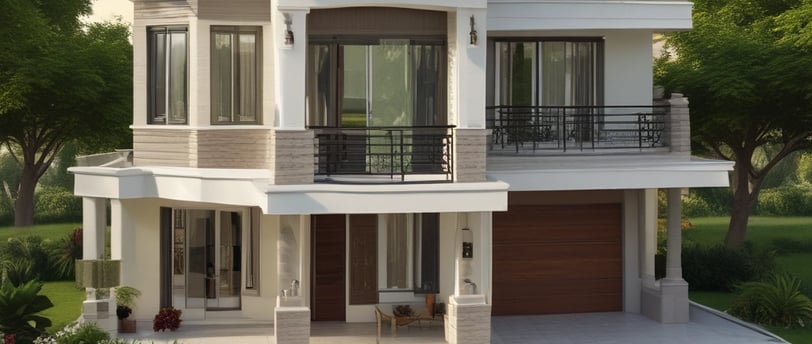A Complete Guide to House Design and Planning in Bhopal
Hire AAA Architects Today for House Design and Planning in Bhopal
2/9/20253 min read


Bhopal, the capital city of Madhya Pradesh, is known for its blend of rich cultural heritage and modern development. Designing and planning a house in Bhopal requires an understanding of the city's climate, cultural aesthetics, legal regulations, and modern living standards. This guide covers all the essential steps and considerations for building your dream home in Bhopal.
1. Understanding Bhopal's Climate and Geography
Bhopal experiences a humid subtropical climate with hot summers, a monsoon season, and mild winters. This climate influences several key design elements:
Tips:
Opt for materials with high heat insulation properties to reduce energy costs.
Include ample ventilation and shading to combat the summer heat.
Design sloped roofs or proper drainage systems to handle monsoon rains efficiently.
2. Selecting the Right Plot
Choosing the right plot of land is crucial for building a home in Bhopal. Consider the following factors:
Location: Areas like Arera Colony, Gulmohar, Hoshangabad Road, and Kolar Road are popular residential zones.
Accessibility: Ensure proximity to schools, markets, hospitals, and transportation routes.
Legal Compliance: Verify the land’s legal documentation, zoning classification, and building permits with local authorities.
3. House Design: Balancing Tradition and Modernity
Bhopal offers a unique opportunity to blend traditional architecture with modern living standards.
Key Design Elements:
Traditional Features: Incorporate courtyards (angan), jaali (lattice) windows, and verandahs for a blend of heritage and function.
Modern Touch: Add contemporary features like large glass windows, open-plan interiors, and smart home technology.
Natural Elements: Utilize gardens, water features, and rooftop solar panels to maintain eco-friendliness.
4. Understanding Local Building Regulations
Before construction begins, you must adhere to local municipal regulations to avoid legal complications.
Regulations to Consider:
Building height and setback limits (distance from property boundaries).
Floor Area Ratio (FAR) limits, which define the allowable construction area.
Environmental regulations, especially in areas near lakes or forests (Bhopal has a number of protected natural zones).
Obtain necessary approvals from Bhopal Municipal Corporation (BMC).
5. Choosing the Right Construction Materials
The materials you choose will impact the durability, maintenance, and aesthetics of your home.
Recommended Materials:
Brick and RCC (Reinforced Cement Concrete): Commonly used for structural strength.
Stone and Marble: Ideal for flooring and exterior accents, especially since Madhya Pradesh is a major producer of natural stone.
Eco-Friendly Options: Consider sustainable materials like fly ash bricks and recycled wood.
6. Working with Architects and Builders
Hiring experienced professionals is key to ensuring a well-executed design and construction process.
Steps:
Research: Look for architects familiar with local styles and regulations.
Portfolio Review: Check their previous projects to gauge design style and quality.
Cost Estimation: Request a detailed budget and timeline to avoid surprises later.
Collaboration: Work closely with both the architect and contractor to incorporate your preferences.
7. Interior Design and Space Planning
The interior design should maximize functionality while maintaining comfort and aesthetic appeal.
Key Considerations:
Room Layout: Allocate spaces for living rooms, bedrooms, kitchens, and bathrooms based on your family’s needs.
Lighting: Maximize natural light using large windows and skylights. Use energy-efficient LED fixtures for artificial lighting.
Storage: Include built-in wardrobes, kitchen cabinets, and storage rooms to keep the home clutter-free.
Sustainability: Use eco-friendly paints, fixtures, and furnishings wherever possible.
8. Utilities and Services
Proper utility planning ensures that your house is comfortable and functional.
Utilities to Plan For:
Water Supply: Connect to the municipal water supply or install a borewell for independent access.
Electricity: Ensure safe electrical wiring and provision for backup power through inverters or generators.
Sewage and Drainage: Plan an efficient drainage system to avoid waterlogging during the monsoon season.
Waste Management: Install waste segregation systems for effective disposal and recycling.
9. Landscaping and Outdoor Spaces
A well-designed outdoor space enhances the beauty and functionality of your property.
Ideas for Landscaping:
Garden: Create a mix of flowering plants, native trees, and shrubs to provide shade and aesthetics.
Courtyards and Patios: Design outdoor seating areas for relaxation or social gatherings.
Rainwater Harvesting: Install systems to collect and store rainwater for reuse.
10. Budgeting and Cost Management
Cost control is essential to avoid overspending during construction.
Tips:
Detailed Planning: Create a detailed budget covering construction, materials, labor, and permits.
Contingency Fund: Set aside 10-15% of the budget for unexpected expenses.
Cost-Saving Measures: Use locally sourced materials and hire contractors with competitive rates.
11. Emphasizing Sustainability
With growing concerns about climate change, incorporating sustainable practices can reduce your home's environmental impact.
Sustainability Tips:
Install solar panels to reduce energy dependence.
Use rainwater harvesting and greywater recycling systems.
Opt for energy-efficient appliances and lighting.
12. Final Approvals and Inspections
Before moving in, ensure all necessary inspections and approvals are complete.
Steps:
Obtain a completion certificate from local authorities.
Conduct safety inspections for electrical wiring, plumbing, and structural integrity.
Ensure compliance with fire safety and environmental standards.
13. Moving In and Maintenance
Once your house is ready, plan your move-in process and establish a routine for regular maintenance.
Tips:
Schedule periodic checks for plumbing, electrical systems, and roofing.
Maintain your garden and outdoor spaces to keep them in good condition.
Keep a list of service providers for quick repairs when needed.
Conclusion
Designing and building a house in Bhopal is an exciting but complex process. By understanding local factors, regulations, and design principles, you can create a home that is both functional and aesthetically pleasing. With proper planning and the right team of professionals, you’ll be well on your way to achieving your dream residence in this vibrant city.
